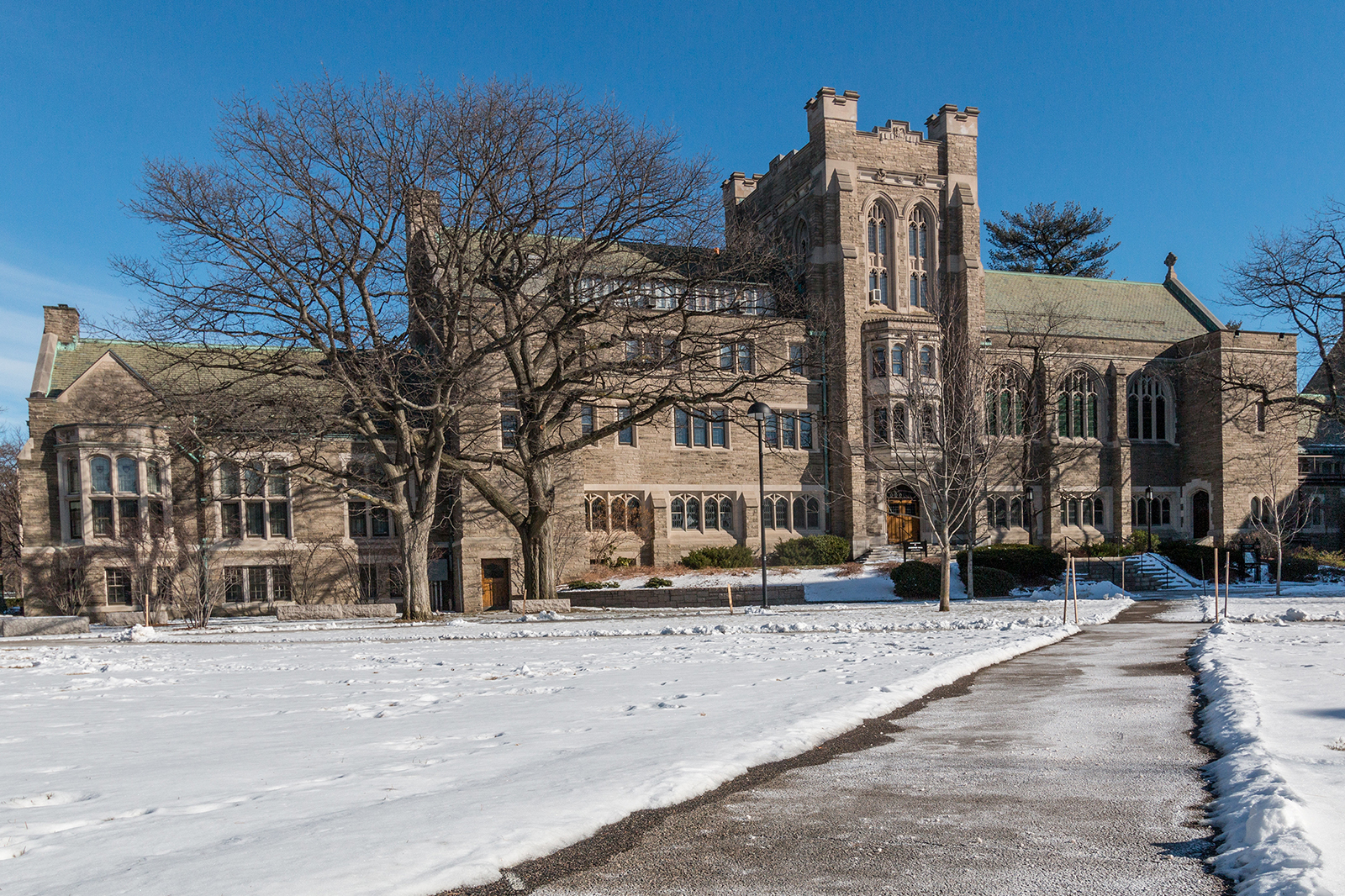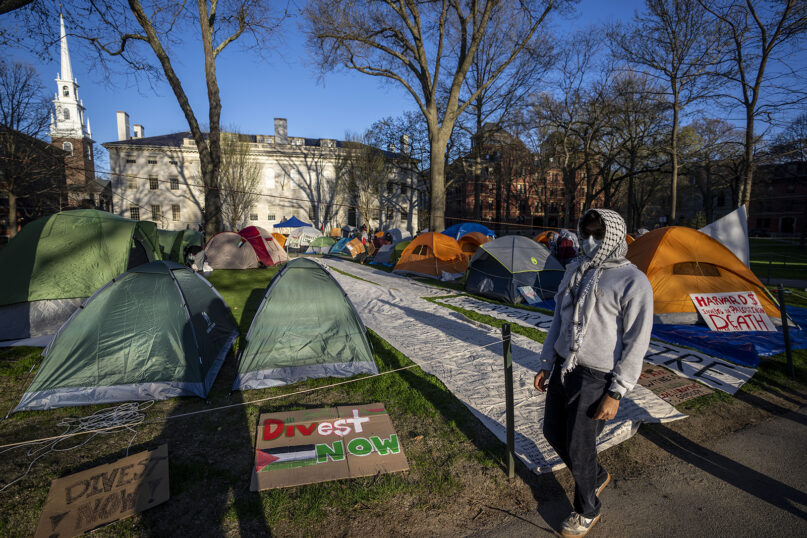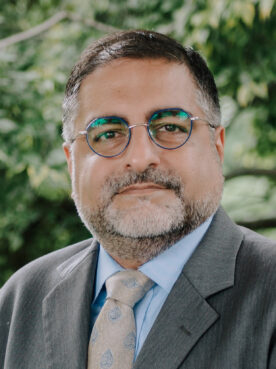
(RNS) — A program at Harvard Divinity School is the latest casualty of the ongoing tensions related to the Israel-Hamas war, with the departure of two administrators and the cancellation of a class on Israel-Palestine.
Diane L. Moore, the associate dean of the Religion and Public Life program at the Harvard Divinity School, was scheduled to retire at the end of the school year in May but departed suddenly in January. A spokesperson for the divinity school would not comment on why she left early or whether she was fired. Moore could not be reached for comment.
Then, earlier this month, the assistant dean for the Religion and Public Life program, Hussein Rashid, wrote to his students that he too was resigning at the end of the semester. In the letter, Rashid, who is a Muslim American, accused the university of tolerating racist and defamatory statements against the program without challenging or disputing them.
“Since I was a student here decades ago, I have been acutely aware of the anti-Muslim bias (amongst other racisms and discriminatory attitudes that exist here),” Rashid wrote. “That bias has only gotten worse and Harvard is not a space where I choose to spend my time. I have no interest in supporting an institution of white supremacy that actively seeks to harm me and mine.”
Rashid said the program he helped administer was routinely vilified by Jewish groups on campus, including the Jewish student group Hillel and the Chabad rabbi who is a chaplain on campus. Administrators never stepped in to defend the program, Rashid said.
He cited as an example an Instagram post by Harvard Chabad, led by Rabbi Hirschy Zarchi, that said: “There are numerous Harvard academic centers that essentially function as Hamas or Palestinian embassies,” citing the Religion in Public Life center “in its entirety,” and concluding, “it’s stunning that there’s no call for some of these centers to be shut down or rebuilt in its entirety.”
Zarchi did not respond to a request for comment.
View this post on Instagram
The Religion in Public Life program, which offers a certificate in religion and public life as well as a master’s degree in religion and public life, was created in 2020 to prepare students going into public policy fields about the role of religion and how it could respond to global conflicts around the world.
The program came under intense criticism after five administrators and one visiting professor in the program wrote in a newsletter days after the Oct. 7, 2023, Hamas attack on Israel that people should “challenge single story narratives that justify vengeance and retaliation.”
“Start with the rockets fired into Israel by Hamas on October 7, 2023 and not with the illegal occupation of Palestinian land by Israel and the blockade of Gaza since 2007, and you have an entirely different story,” they wrote.“To acknowledge the context out of which this latest spate of violence arises is not to diminish the pain and suffering of Israeli and Palestinian victims,” they added.
In response to the newsletter and more generally to the courses taught there, several Jewish organizations, including Hillel and Chabad, accused the program of blaming Israel for the Oct. 7 attack and justifying the actions of Hamas.
The program had been offering a class called “Narratives of Displacement and Belonging in Israel-Palestine.” That class, which included a two-week trip to Israel and the occupied West Bank, was supposed to be offered this spring but was canceled.

A student protester against the war in Gaza walks past tents and banners in an encampment in Harvard Yard, at Harvard University in Cambridge, Mass., on April 25, 2024. (AP Photo/Ben Curtis)
Harvard was among several U.S. schools with active pro-Palestinian student encampments last year. Its former president, Claudine Gay, resigned after a congressional hearing where she was unable to unequivocally say whether calls on campus for the genocide of Jews would violate the school’s conduct policy.
Last month, Harvard settled two lawsuits with Jewish groups that claimed the school had not taken appropriate steps to keep its campus from becoming a hostile environment for Jewish and Israeli students in the aftermath of the Oct. 7, 2023, attacks.
RELATED: Harvard agrees to controversial definition of antisemitism in settling lawsuits
As part of the settlement, Harvard also agreed to adopt the International Holocaust Remembrance Alliance’s definition of antisemitism when investigating complaints. The controversial definition, which critics say quashes dissent of Israel, offers among several examples of antisemitism the claim that the existence of a state of Israel is a racist endeavor.
On the day after the settlement was announced, another Harvard administrator, Jay Ulfelder, program director of the Nonviolent Action Lab at Harvard Kennedy School’s Ash Center for Democratic Governance and Innovation, resigned.
In his letter of resignation, he blamed Harvard for “deepening repression of activism against the genocide in Palestine” and said the adoption of the IHRA antisemitism definition gave him the “final push.”
“Harvard’s administration has responded to that activism by ignoring or rejecting students’ demands, punishing student protesters, and adopting rules and definitions that increasingly restrict political speech at the university, particularly but not exclusively around Israel and Palestine,” Ulfelder wrote.

Hussein Rashid. (Courtesy photo)
This week, nearly 200 Harvard faculty, students, staff and alumni submitted discrimination complaints to the university after its medical school canceled a panel featuring Gazan patients receiving care in Boston.
Rabbi Jason Rubenstein, executive director of Harvard Hillel, who had denounced pro-Palestinian protests and accused the university of furthering antisemitism against Jewish students, celebrated the resignations. In a letter to members of Harvard’s Jewish community titled “Raising Our Sights,” he wrote, “In the ten days following the settlement, three of the most vocal anti-Zionists have departed, or announced their impending departure, from Harvard’s faculty.”
In an email to RNS, Rubenstein acknowledged he had earlier referred to the program on Religion in Public Life as having “a kind of entrenched anti-Zionist orthodoxy.” During an August Zoom presentation with Harvard alumni and parents he had said, “Zionist Jews are portrayed not just negatively but really, um, kind of inhumanly, uh, as evil.”
Harvard, Rashid said, never challenged those statements.
“It became a very permissive attitude to accuse us if we said anything that people didn’t like,” Rashid added. “I kept asking for somebody to say something, and they never did. I find this an untenable situation. I have to get out of an environment that is actively and directly harmful to me.”
RELATED: Harvard task forces find discrimination and harassment against Jews, Muslims
